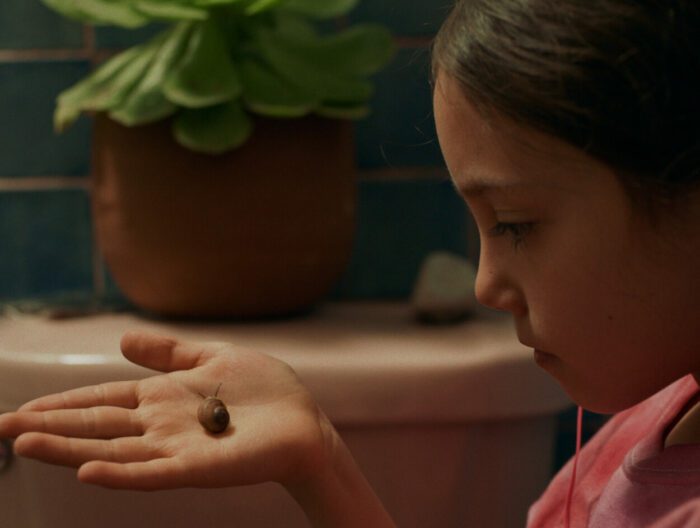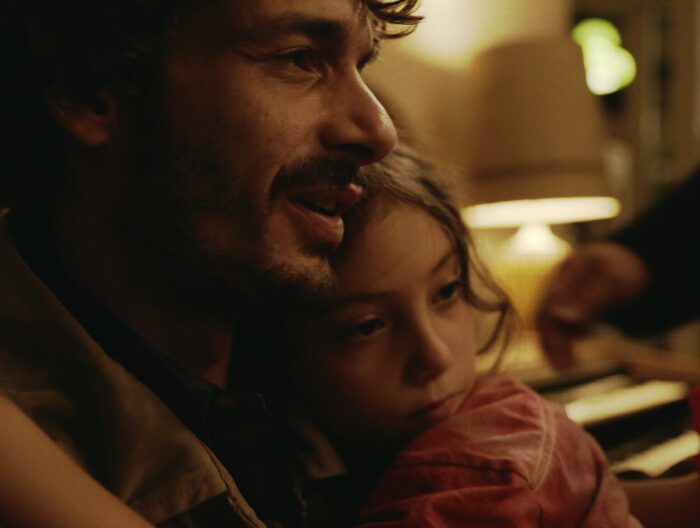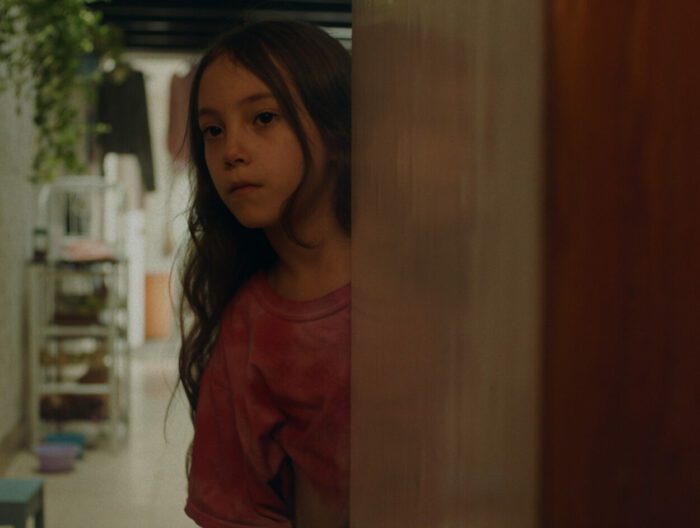Lila Avilés’ long-awaited follow-up to her 2018 The Chambermaid finds the Mexican writer-director again in fine form. Tótem, like her feature debut, was its country’s nomination for the Academy Awards’ Best International Feature and stays the course with a gentle, unwavering, realistic focus, here on a seven-year-old girl processing the complex, possibly collapsing world around her. Balancing nothing less than life and death themselves, Tótem evokes a wisdom beyond its young protagonist’s few precious years.

Aviles’ narrative—again here, she writes and directs—takes place on a single day, a meaningful one in the life of little Sol (Naíma Sentíes, who is by turns pensive and charming, and stellar throughout). It’s her father’s birthday, and her mother, her aunts, and a gaggle of other relatives of all generations gather at her family home to celebrate. The film opens, gently comically, in a public restroom, where a mildly constipated Sol tries—without success, despite her mother (Iazua Larios) Lucia’s patient encouragement—to take care of her business. On the car ride home from shopping, as they pass under a bridge, Sol holds her breath and makes a wish that will break your heart.
“I wished for Daddy not to die.”
Those few quick minutes are indicative of the gentle balance between life and death, quiet comedy and impending tragedy, that Tótem will so adroitly balance over its 90-odd minutes. Once Sol and her mother arrive home, they are swept up in preparations for Sol’s father’s birthday: he, Tonatiuh, or Tona for short (Mateo García Elizondo), is indeed ill, so ill from an unspecified (at first) affliction he can barely walk, an illness that has cost him much time with his precious, precocious daughter.

To what degree young Sol fathoms the depths of her father’s sickness is also uncertain at first. But her parents and extended family, the the aunts, uncles, and others who arrive know all too well that Tona is suffering, his treatments failing, and his death impending. Whether he needs chemotherapy, or how the financially-struggling family might afford it or any other treatment, is an ongoing part of the conversation, spoken in code words and parsed syllables by the adults to shield the young ones.
The mood, though often serious, is never dour. Interspersed with those difficult conversations are little peals of laughter, little smiles, usually initiated by the sprightly Sol, whose costume for the day is a brightly-colored clown wig and bright red rubber nose. She’s inquisitive, her soulful eyes searching for answers, but she’s a child, prone to silliness and giddiness, and never quite conquering her mild case of constipation. (There is the possibility that Avilés is playing a bit with Freud’s famous if oft-rebuked theory of the anal stage, especially in that little Sol needs to be able to express, not restrain, her movements in order to grow toward maturity.)
Once Tótem‘s narrative settles into the house in which Tona and Lucia’s family is all ensconced for the celebration, we see—as does Sol—more familial conflict unfold. One aunt is controlling, though her decisions seem to have jeopardized the family’s fragile finances. Another withdraws into drunken sullenness and passive aggression. Sol’s grandfather Roberto (Alberto Amador), fond of tending to a bonsai tree he can prune and guide with greater surety than his own family, glares silently, only occasionally speaking through his assistive prosthesis, its lack of inflection making his words seem robotic and ethereal. But what is there to be joyous about when he, when the others, all know that even in his frail condition he will outlive his own son?

While the adults in the house speak most of the dialogue, Avilés adeptly keeps the camera’s perspective close to Sol as she pines for my time with her father. She’s told, again and again, he needs to rest, and he does. Waiting patiently for time with him, Sol eavesdrops, experiments with a drink of wine (one wonders about the genetic predispositions for disease and addiction), and silently processes what she hears. When the celebration finally arrives, she and her mother perform a comic opera piece, Sol on her hidden mother’s shoulders in a single suit, so she appears six-plus feet tall, in her clown makeup and wig belting out a lip-synched aria with a passion that belies her youth.
Lucia reveals the gag, unbuttoning the suit to show Sol on her shoulders. “Now there’s two of us,” she says, like a magician onstage revealing the secret. “Now just one.” It’s a line that cuts deep when you realize it applies not to Lucia and Sol but to Sol and Tona or even to Lucia and Tona. Throughout Tótem, Avilés and her cinematographer Diego Tenorio find deftly, almost magically slide about from room to room, playing with the overlapping conversations and complex family dynamics as they unfold across the course of the day. It’s an extended single setting that works as well here as it does in Erige Sehiri’s lovely Under the Fig Trees, where an orchard’s trees provide shade, respite, and privacy but are porous enough that even quiet conversations can be overheard.
Tótem eschews any grand gestures, climactic revelations, or soapbox speeches. Instead, it approaches death with dignity and indignity alike, with all the foibles and fracas and gentle good grace of a family conflicted with itself, not knowing how best to address an impending and far-too-early death. No one does, of course. As humans, we muddle about, confused and uncertain, sometimes tactless, often loving and with good intentions in the face of a fate we know we can’t control. That Avilés can manage this feat, and do so largely from the wide eyes of an unforgettable young character in Naíma Sentíes’ Sol, whose quiet gaze concludes the film, is a nifty little act of magic in and of itself.




